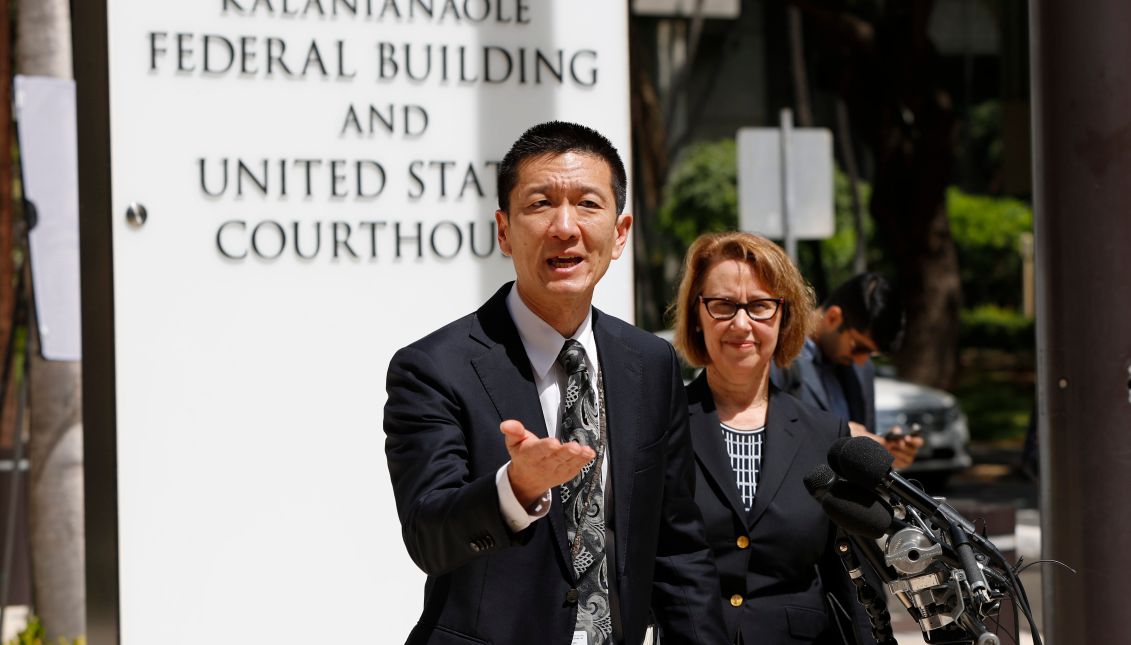
Trump's New Travel Ban Blocked Nationwide
Second time is not the charm. At least when it comes to Donald Trump's travel ban on Muslim-country citizens and refugees.
A US federal judge on Wednesday temporarily blocked the President's new immigration ban, just hours before it was scheduled to enter into force.
In federal court in Honolulu, US District Judge Derrick Watson heard arguments on the state of Hawaii's request that a temporary restraining order be issued for the ban, and he ruled in favor of that motion Wednesday afternoon, thus preventing Trump's executive order from going into effect on Thursday.
Judge Derrick Watson cited "questionable evidence" in the government's argument that the ban was a matter of national security. The order would have placed a 90-day ban on people from six mainly Muslim nations and a 120-day ban on refugees. Mr Trump insists the move is to stop terrorists from entering the US but critics say it is discriminatory.
After hearing the judge ruling, President Trump said it was an "unprecedented judicial overreach".
The suspension of the second travel ban sets stage for an epic legal battle between the White House and the US Justice. The first version of the travel ban, issued in late January, sparked confusion and protests across the country, and was blocked by a judge in Seattle. The earlier version banned travel to citizens from seven Muslim-majority countries: Yemen, Iraq, Iran, Libya, Syria, Somalia and Sudan, including those with proper visas, taking the stance that they present a terrorism risk.
The revised version removed Iraq from the list and permitted the entrance to citizens with all the documentation in order. It also would eliminate the ongoing prohibition on entry for Syrian refugees and the exemption of Syrian Christians from the ban. The executive order signed by the president also reduces from 110,000 to 50,000 the number of refugees the US would take in during 2017.
Several states are making efforts to halt the immigration ban, and on Wednesday presentations were made in federal court in Hawaii, Maryland and Washington state as to why it should not be implemented, as reported in EFE.
Hawaii said that the order discriminates on the basis of nationality and would make it impossible for state residents to be visited by relatives from the six Muslim-majority countries included in the ban.
CONTENIDO RELACIONADO
The state also argued that the travel ban would hurt the state's big tourism industry, as well as the ability to attract foreign students and recruit foreign workers.
"Hawaii is special in that it has always been non-discriminatory in both its history and constitution," Hawaii Attorney General Douglas Chin said. "Twenty percent of the people are foreign-born, 100,000 are non-citizens and 20 percent of the labor force is foreign-born."
“We’re going to fight this terrible rule, we’re going to take this case as far as it will go, including the supreme court. We’re going to win,” Trump said at a campaign-style rally in Nashville, Tennessee, on Wednesday night, just hours before the travel order was supposed to take effect.
In a defiant tone, Trump potentially dug himself deeper into a legal hole, reported The Guardian. Trump told the Nashville crowd that the revised travel ban was merely “a watered down version of the order that was blocked by another judge and should never have been blocked to start with”. He even suggested that he might “go back to the first one and go all the way”, indicating that he was minded to revert to the original executive order in a way that could further intensify the conflict with the courts.










DEJE UN COMENTARIO:
¡Únete a la discusión! Deja un comentario.